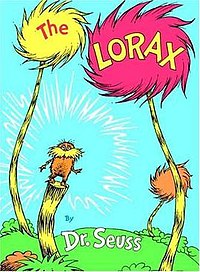Lou Vs. the Lorax


"The Lorax" by Dr. Seuss, cover illustration.
The Lorax tells the story of the titular creature, protector of animals and plants, who persistently warns the “Once-ler”, an ambition business owner who uses a certain kind of tree under the protection of the Lorax to make “Thneeds”, against the long-term effects of the factory owner’s pollution and over-consumption of the special trees. When the “Once-ler” irresponsibly ignores the Lorax’s warnings, environmental and financial ruin ensues. Although it can be said with confidence that the message of The Lorax is pro-environment and that the environmental movement has been long associated with “liberal” political thought, the moral of the story can hardly said to be more political than practical – after all, the business owner in the story was unable to continue his business due to the unsustainability of his pursuits. Awareness of resource limitation could easily be touted as a pro-business concept from this perspective.

"The Borrowers" by Mary Norton, cover illustration.
On the other hand, the book upon which The Secret World of Arietty is based was published in 1952, decades before any inkling of the Occupy movement and in the midst of the Second Red Scare and anxiety surrounding the influence of new media such as television and comics on children. This story in particular is preceded by many and varied apolitical fairy tale creatures surreptitiously inhabiting the human realm of existence.
Taking these things into consideration, the sort of conjecture about the indoctrination of children through film shown in this news segment reveals itself as alarmist and ill-founded. Critiques of children’s media in a similar vein are far from uncommon, exemplified by the controversies surrounding the messages of tolerance incorporated into the classic television program Sesame Street, beginning with its advent in the 1960s. It might be useful to ask ourselves: to what degree are people in the news media who preach about the indoctrination of children actually investigating causal relationships between viewing certain programs or films and children’s behavior? Or will pundits like Dobbs someday be seen in the same light as Dr. Fredric Wertham of Seduction of the Innocent infamy?
—–Anna Bennett
